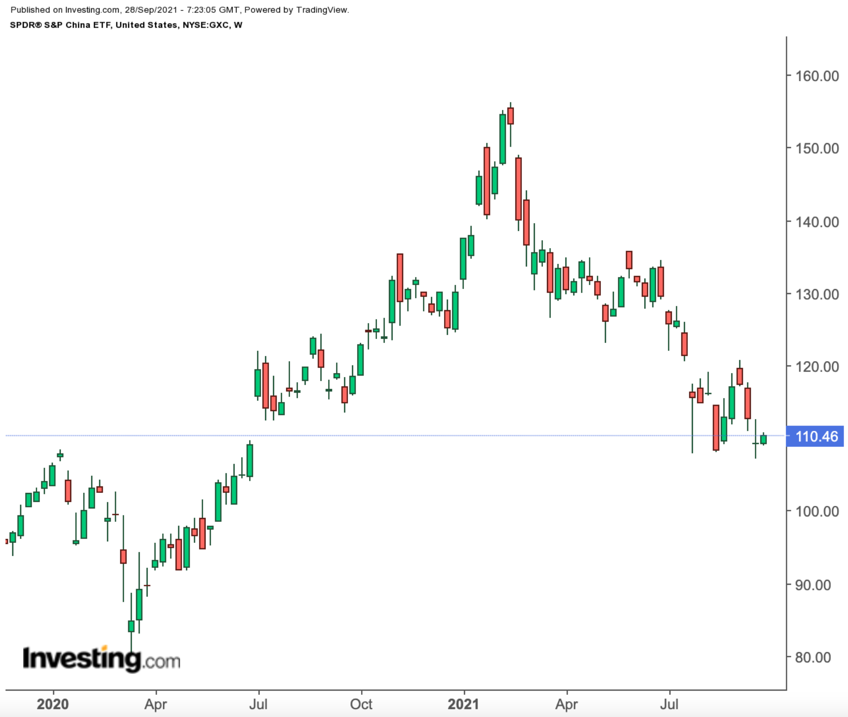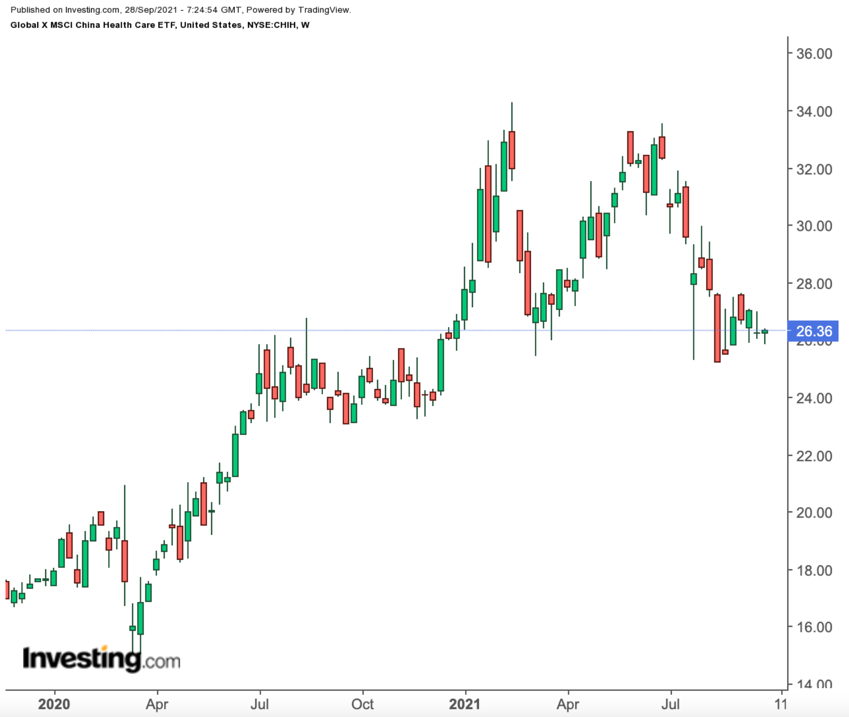Chinese authorities have been cracking down on public companies—a topic we covered (here, here, and here). There has been increased regulatory oversight in diverse sectors, including e-commerce, online gaming, for-profit education, real estate, and tobacco. As a result, a large number of stocks have lost significant value so far in 2021.
For instance, here’s how some of the widely followed stocks have fared year-to-date (YTD):
- Alibaba (NYSE:BABA) - down 36.2% (YTD);
- Baidu (NASDAQ:BIDU) - down 27.9% (YTD);
- Didi Global (NYSE:DIDI)) - down 41.2% since going public in June:
- NetEase (NASDAQ:NTES) - down 15.1% (YTD);
- New Oriental Education & Technology (NYSE:EDU) - down 89.7% (YTD);
- Nio (NYSE:NIO) - down 26.2% (YTD);
- Pinduoduo (NASDAQ:PDD) - down 46.4% (YTD);
- Tencent (OTC:TCEHY) - down 18.1% (YTD).
Meanwhile, there is widespread concern that the leading property developer China Evergrande Group (OTC:EGRNY) could default on debt of $300billion. Fear of contagion has contributed to the recent volatility in global markets.
However, despite the losses in individual shares, the Shenzhen Composite index and the Shanghai Composite index are both up about 3.2% YTD. As a result, some investors wonder whether most of the declines in Chinese stocks could be over, at least for the time being.
Despite numerous question marks, China still has the world’s second-largest economy. Therefore, contrarian investors might find the current risk/reward trade-off favorable. Those readers might want to research the following two exchange-traded funds (ETFs) further.
1. SPDR® S&P® China ETF
- Current Price: $110.46
- 52-Week Range: $107.16 - $156.29
- Dividend Yield: 1.17%
- Expense Ratio: 0.59% per year
The SPDR® S&P China ETF (NYSE:GXC) invests in a wide range of China-based businesses. The fund gives access to both “China A Shares” as well as companies that trade as American Depositary Receipts (ADRs) in the US.
GXC, which has 902 holdings, tracks the returns of the S&P® China BMI Index. The fund started trading in March 2007.
In terms of the sub-sectoral breakdown, the Consumer Discretionary sector comprises the highest portion with 27.75%, followed by the Communication Services and Financials sectors with 16% and 13.48%, respectively. The top 10 stocks account for about a third of net assets of $1.73 billion.
Social media and entertainment group Tencent; e-commerce giants Alibaba and JD.com (NASDAQ:JD); food delivery platform Meituan (OTC:MPNGF); and China Construction Bank (OTC:CICHF) lead the names in the fund.
Over the past 12 months, the fund is down about 4.3% and has lost over 15.5% since January 2021. Trailing P/E and P/B ratios stand at 11.64x and 1.73x. Those readers who do not think more downside is likely could consider investing around these levels.
2. Global X MSCI China Health Care ETF
- Current Price: $26.36
- 52-Week Range: $23.09 - $34.29
- Dividend Yield: 0.07%
- Expense Ratio: 0.65% per year
According to a report by the US-China Economic and Security Review Commission:
“Per capita healthcare spending in China is increasing, but it remains low compared with other major economies… Chinese policymakers have prioritized the improvement of healthcare outcomes, most notably in the Healthy China 2030 Plan released in 2016… Even with near-universal public health insurance, out-of-pocket costs in China accounted for 28.3 percent of all healthcare expenditure in 2019 compared to 11 percent in the United States.”
Recent metrics highlight:
“China's healthcare market is expected to grow from RMB6 trillion in 2019 to RMB16 trillion in 2030.. There is rapid growth in demand from an aging and increasingly affluent population.”
Our second fund, the Global X MSCI China Health Care ETF (NYSE:CHIH) gives access to the Chinese health care sector, which is receiving significant investor attention.
CHIH has 91 holdings, and tracks the returns of the MSCI China Index. The fund started trading in December 2018, and has around $17.8 million in assets.
In terms of the sub-sectoral breakdown, we first see the Biotechnology sector (34.38%). Next in line are Pharmaceuticals: Major (27.57%) and Pharmaceuticals: Other (9.29%) and Medical Specialties (8.21%). The leading 10 names comprise around half of the fund.
Biologics technology platform WuXi Biologics (HK:2269), biotechnology group BeiGene (NASDAQ:BGNE), which specialises in cancer therapeutics; leading pharma names CSPC Pharmaceutical (OTC:CHJTF) and Sino Biopharmaceutical (OTC:SBHMY); and commercial stage biopharmaceutical company Zai Lab (NASDAQ:ZLAB) top the names in the roster.
Over the past year, the fund is up about 14.1%, but down 1.2% in 2021. We would consider buying the fund on any further pullbacks.
